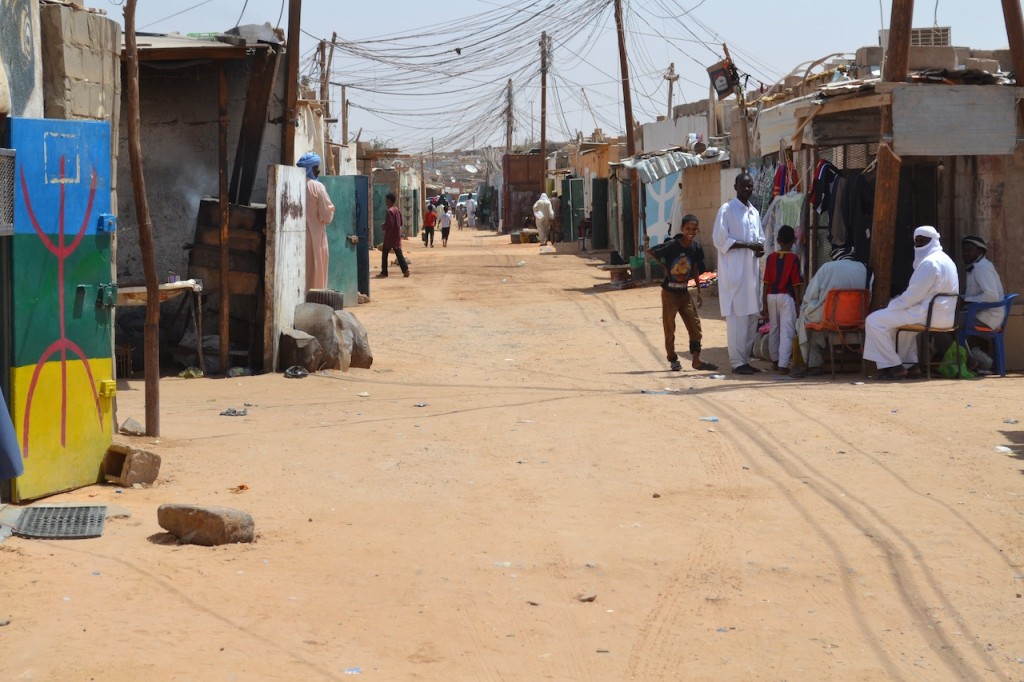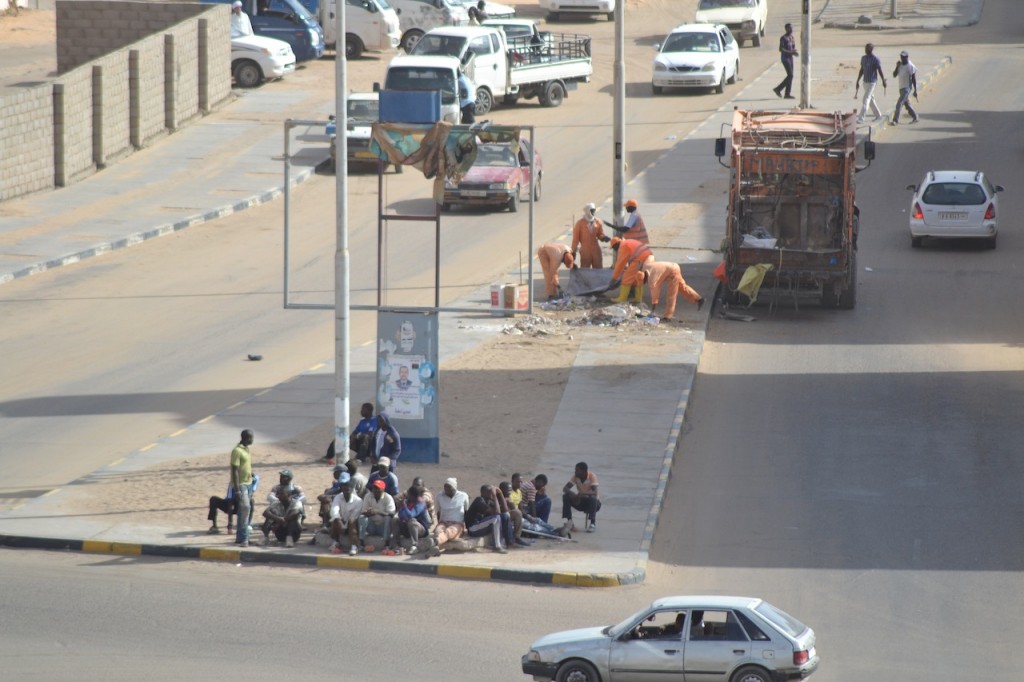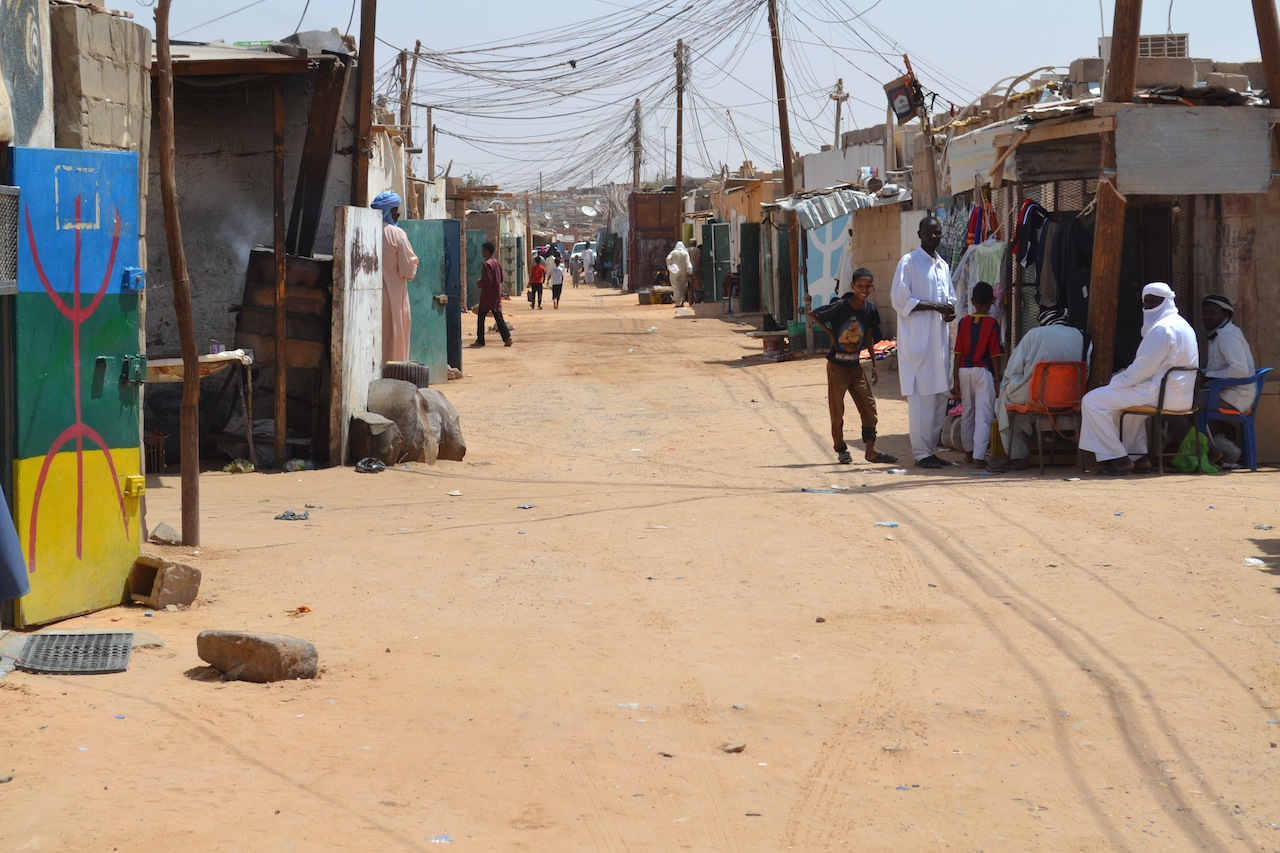By Mathieu Galtier.

Sebha, 22 September 2013:
The King (of Kings of Africa) is dead. Long live the people!
Since the death of Qaddafi, . . .[restrict]control of Fezzan has been divided between the three main ethnic groups: Arabs, Tebus and Tuaregs. With state authority absent in this part of Libya, each of the three “people” is trying to implement its own rules in its strongholds.
Sebha, capital of Fezzan, has officially 150.000 inhabitants, “probably more than 200,000 actually,” Ayoub Zaroug, president of the local council, thinks. Arabs, Tuaregs and Tebus are living in the city.
Together, but each one in a specific location.
For instance, in Qaheera area (formerly known as Tayuri area), in the south-east of the town, Arabs, Tebus and Tuaregs have their owns blocks.
“We are living peacefully all together. Last year, Awlad Sulaiman tribe and Tebus fought each other but now the situation is under control. Everyone is staying in their blocks. But there is now real security because the police don’t want to come to Qaheera. Criminals have better weapons than them so they fear for their lives”, Adam Ahmed Dazi, the (Tebu) chief of the area, reveals.
Only 60 men – thuwars and ordinary citizens – have volunteered to be part of the security force in Qaheera. As a result, the former Indian construction site has been annexed by criminals and offenders. The site is like an open supermarket for drugs, alcohol, oil, weapons and the like.
No police, no justice, no army in Fezzan
“I understand that policemen are afraid. They have guns; the bad guys have RPGs. We need a strong government”, Ayoub Zaroug says.
Waiting for the dream to come true, local leaders use resourcefulness. Judges refuse to trial criminals throughout Fezzan because they fear the consequences. So when one s caught, he is handed over to leaders of his tribe who offer to be guarantors if he has to be judged one day. Murderers are kept in jail because the judge continuously postpones the trial.
No police, no justice and no army to control the border.
Libyan have to rely on their themselves alone.
“Sebha, it is not like Tripoli, Benghazi or Misrata. Here, nobody believed Qaddafi could be overthrown. When he died, the only remaining institutions were the tribes”, Aboazom Al Lafi, chairman of the National Council for Fezzan, explains. Even the Arabs are not homogeneous. There are four main Arabic tribes in Sebha: Awlad Sulaiman, Qaddadfa , Magarha and Warfalla. Awlad Sulaiman members despise Qaddadfa because they consider themselves as the true thuwars in south. The Qaddadfa are not chased in Sebha but they suffer from discrimination. They all live in Manshyia district and keep a low-profile – although not on the night between 31 August and 1 September, the 44th anniversary of Qaddafi’s coup. That night, Qaddafi loyalists shot in the air with all the weapons they had to show they were still there, as the Libya Herald saw.
Recently, the Magarha tribe put pressure on the government by cutting the Man-Made River after the abduction of Anoud Senussi who is from Magarha tribe.
The main rivalry in Fezzan has been between Tuaregs and Tebus. The Tuareg control Obari and the west part of Fezzan. The Tebus’ stronghold is from Murzuk to Kufra. Right after the revolution, Tebus and Tuaregs fought to extend their geographical sphere of influence. Now, for the first time, they have decided to collaborate to control the buffer zone at the border between the Tumu border post (run by Tebus) and the pass of Anay (under Tuareg control). It is an area which includes the Salvador pass (between Libya, Niger and Algeria), widely used by traffickers.
Tuaregs: “It is racism!”
Tuaregs complain about discrimination from Arabs. Jeli Ali, a member of the Committee of Reconciliation in Obari is lobbying in order to give Libyan national ID numbers to about 14.000 Tuaregs families who are registered. “It is racism! Who are the genuine inhabitants in Libya? Not the Arabs but Tuaregs, Tebus and Amazighs. We have the land, they have a piece of paper. But the history proves that minorities get their rights, by force if necessary”, he says. Moreover, Obari has two local councils – one chosen during the NTC period, supported by Moussa Al-Koni (a former Tuareg NTC member), and the elected one. This duality has prevented the town from developing although a court decision sided with the latter in August.

Threats to oil revenue
The nationality question is a main concern for Arabs in Sebha. They fear that they become a minority compared to Tebus and Tuaregs in Fezzan. “There is a risk of war if all the foreigners from Chad, Niger or Algeria get Libyan nationality”, Slima Naza, a local journalist, predicted. The actual law stipulates that to be Libyan, a man has have to prove that his father’s family was Libyan at independence in 1951. It is a difficult condition to prove for Tuaregs or Tebus who live in desert right in the middle of Libya/Chad/Niger/Algeria borders. Clarly, the Constitutional Commision will have to find a balance solution to this problem
The nationality issue is less important among Tebus because there are fewer families. Above all, the Tebu are more interested in obtaining greater political and financial influence.
Colonel Barca, head of security in Murzuk area, will send “by the end of the month” three requests for Fezzan to Tripoli: better representation in the government, in the diplomacy and the revenue of the oil which is extracted in Fezzan. The last is obviously the most sensitive. The protection of oil sites in Fezzan is under the control of Petroleum Facilities Guards (PFG), an state organisation which depends on the Ministry of Defence (and Zintani brigades). “If these requests are not fulfilled by the government in Tripoli then we will have to demand a federal state. And, if we do deamand a federal State, we are confident that all of Africa will stand with us ”, Colonel Barca threatens.
Eastern Federalists visited Fezzan
He is feared and respected by people in the Murzuk area, in which Arabs and Tuaregs live in small towns and villages around Murzuk itself. For example, on the 13-member local council there are nine Arabs, one Tuareg and three Tebus. But only the Tebu have executive positions.
Ibrahim Yousef, chairman of the association Sons of Desert in Murzuk, went to Benghazi to meet the federalists. He says he was concerned about their speech about the fact that Libya should divide in three states but he was convinced by the federalism idea: “The cow eats the grass from south, but it is eaten by northern inhabitants: oil is coming from Fezzan but refineries are in north. So it is Tripoli which takes benefits from petrol.” Eastern federalists then met Colonel Barca in Murzuk. They wanted to convince him to support them in order to get a maximum of seats in the Constitutional Commision. For the moment, the Tebu leader feels confident enough to reject the proposition from Benghazi activists.
But can Fezzan use strong arm tactics with Tripoli? That is another question. [/restrict]








